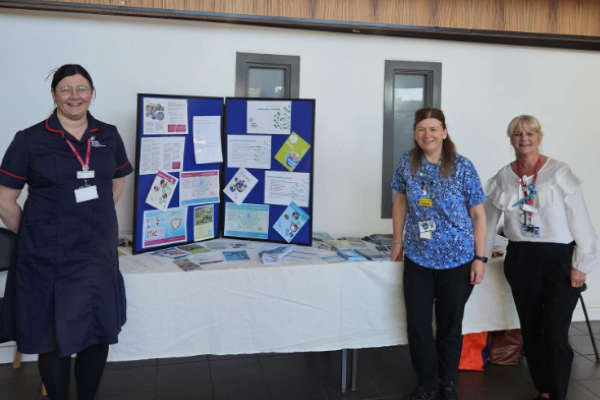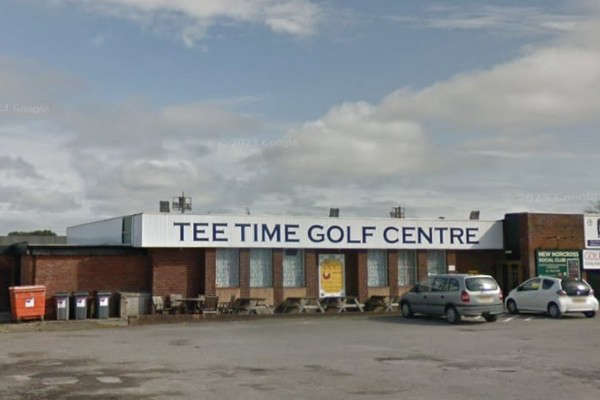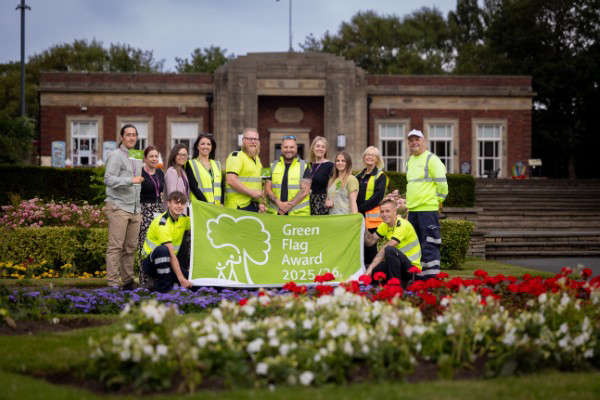
Trinity Hospice is encouraging the Blackpool, Fylde and Wyre community to join theconversation about death, dying, and grief in ways that resonate with them during this year’sDying Matters Awareness Week
The national campaign, led by Hospice UK, runs from5th-11th May and encourages open and honest discussions about end of life experiences. This year’s theme, The Culture of Dying Matters, delves into the diverse ways communities across the UK discuss, navigate, and commemorate death and dying, while emphasising the shared emotions that connect us all in grief and loss. Throughout the week, events will be taking place across the Fylde coast to help people open up about the important subject. On Tuesday, representatives from Trinity’s Living Well Service joined the Community End-of-Life Team from Blackpool Teaching Hospitals in Fleetwood to promote Dying Matters Week and share the importance of advanced care planning conversations. And the Trust’s SWAN Team were opening conversations throughout Blackpool Victoria Hospital around death and dying while supporting people to make their future wishes known and plan for future care. Wednesday is Advance Care Planning Day, encouraging communities to think about their future care wishes. And because planning for the future is important all year round, the teams are promoting the Last Days Matter Programme – a collaboration between Trinity and the Trust to a series of workshops which will empower people in communities across the Fylde coast to hold important conversations about death and dying with confidence. Trinity’s Chief Executive, David Houston said: “Death and dying remains, for some, such a taboo subject, but planning for the end of life is just as important as planning for a new arrival. “The more we talk about our wishes, the more our loved ones can be confident that, when the time comes, they are helping to give us the death we want. The events taking place across the Fylde coast this week will help our communities be comfortable when talking about death and dying, and take that home to their loved ones to extend the conversation. ”Chris White, Senior Digital Marketing & Campaign Manager at Hospice UK, said: “Talking about death and dying is never easy, but it’s vital. Honest and timely conversations can ensure that people get the support they need and help loved ones better understand
their wishes. “This Dying Matters Awareness Week, we’re focusing on the diverse cultural approaches to death and dying within the UK and how those perspectives can inspire more open, meaningful discussions in every community. “We hope that by sharing and learning from these experiences, we can create a society where talking about death is less of a taboo and where everyone feels empowered to have these conversations. ”Trinity is also taking the opportunity to highlight the hospice funding crisis as more people need vital hospice care while central government support is at an all-time low. David added: “We are not an insignificant part of the wider health and social care system. We have a large hospital team, working in partnership with Blackpool Victoria Hospital, which supported 31% of people who died in hospital last year. Our In-patient Unit, which cares for people with the most complex and challenging health care needs at the end of life, cared for 455 patients last year and supported 310 deaths.“ Overall, we supported 41% of all deaths that occurred on the Fylde coast last year. “For each of those individuals, their families and people close to them, that journey was transformational. We only have one chance to get it right.“ Nationally, we are at a tipping point with regard to palliative and end-of-life care and the whole health and social care system is on the edge. Yet we were given 0.6% increase in funding this year, and a 0% increase in our funding the previous year. And we are all worse off by 15% through inflation. “People will continue to die, and effective holistic care requires investment. If that’s not there, people’s chances of a good death become far more variable. “In the next 20 years there will be a 20% increase in the number of people dying in UK –we’re all living longer with complex conditions. Now is the time for the government to fundamentally tackle this funding crisis so that all those who need access to consistently good palliative and end-of-life care, which is free at the point of need are able to do so."

 Norcross roundabout is dangerous and still needs highlighting, says MP
Norcross roundabout is dangerous and still needs highlighting, says MP
 New adventure golf scheme to go before planners next week
New adventure golf scheme to go before planners next week
 Raising the Green Flag across Blackpool Parks
Raising the Green Flag across Blackpool Parks
 Resort residents react to major changes planned for bin collections
Resort residents react to major changes planned for bin collections
 Lancashire Police send serious message to all drivers
Lancashire Police send serious message to all drivers
 Lancashire Police name Response Officer of the Year
Lancashire Police name Response Officer of the Year


